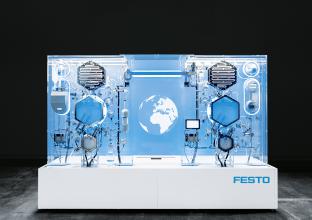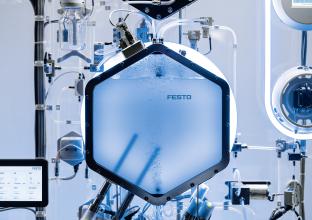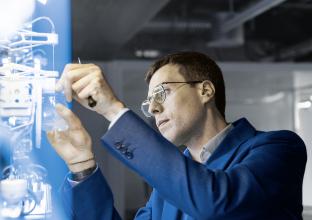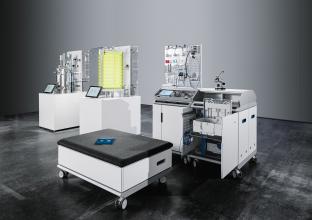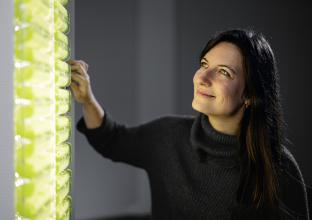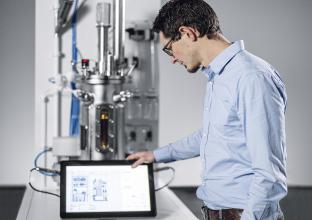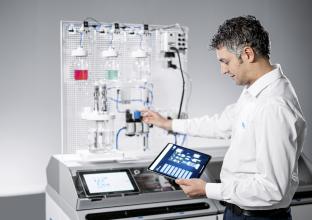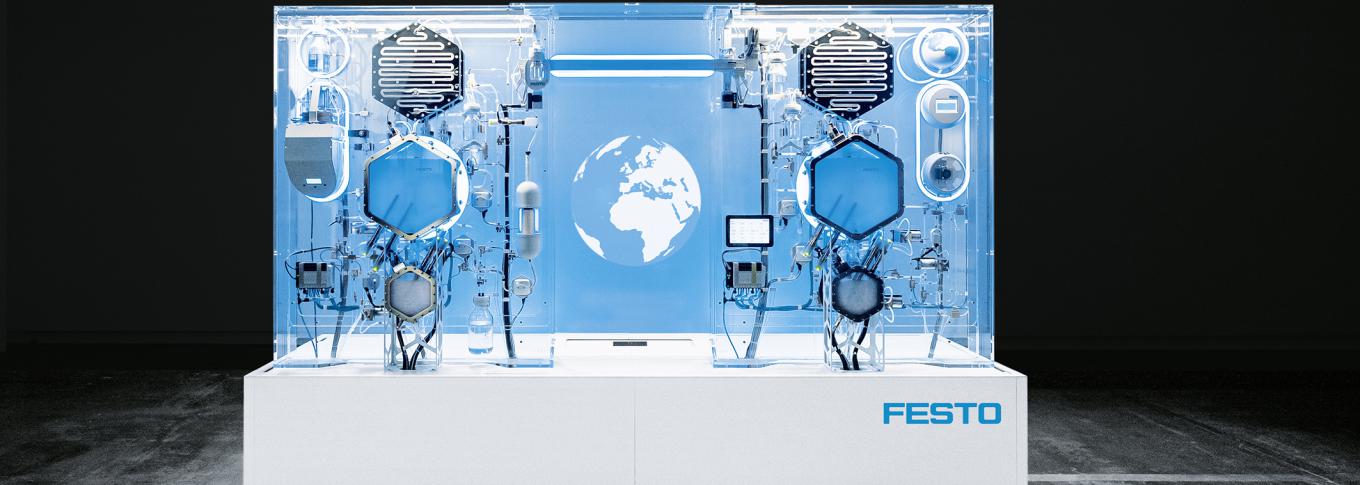
Biologization Makes Ecological Innovations Possible for the World of Tomorrow
Festo presented a unique concept for the simple storage and safe transportation of hydrogen using bacteria with its “BionicHydrogenBattery” exhibit in 2024. The company also demonstrated how industrial bioprocesses can be operated efficiently in the long-term using a wide range of components and solutions from the Festo product portfolio. Festo is also committed to biologization as a field of learning: with modular learning systems, an additional Chamber of Commerce qualification and the development of a “Biomechatronics” degree course.
With its automation technology, Festo aims to provide climate-friendly solutions and thereby contribute to improving the quality of life of present and future generations. For this reason, the company is working intensively on how processes can be carried out with less material consumption and more recycling, and which alternative materials can be used. Developing biology as a field of activity for automation is particularly promising. The smallest factory of the future will be found in a biological cell.
With automation technology, biological processes that take a long time in nature can be accelerated, scaled up and made economically viable as a result. Thanks to a combination of many years of experience and highly developed technology, Festo plays a leading role, demonstrating what is possible with automation and sophisticated control and regulation technology in the field of biologization. Following its “PhotoBionicCell” (2022) and “BionicCellFactory” (2023) bioreactors, which focused on the cultivation of algae, Festo's current “BionicHydrogenBattery” project deals with one of the energy sources of tomorrow: hydrogen.
BionicHydrogenBattery – safe storage and transportation of hydrogen with the help of bacteria
As things stand at present, hydrogen can only be stored and transported safely and in a space-saving manner using processes that require extremely high or low temperatures and high pressures of 150-700 bar, which requires a lot of energy. With the fully automated biotechnological system “BionicHydrogenBattery”, Festo is presenting a completely new approach: the volatile substance is converted into formic acid with the help of bacteria in a low-risk and energy-efficient manner – and at comparatively low temperatures of around 65 °C and a low pressure of 1.5 bar. The acid can be easily stored and transported. At the destination, the same bacteria reverse the process and decompose the acid back into CO2 and hydrogen. While the latter can be used to generate electricity, the high-purity CO2 could be recycled and used in the beverage industry, for example. In the exhibit, it is recycled within the scope of a circular economy and reused to produce formic acid.
The core of the biological process is the bacterium Thermoanaerobacter kivui (T. kivui). These bacteria have a special enzyme that enables them to convert hydrogen and CO2 into formic acid. This process was discovered and fundamentally researched by the team led by Prof. Dr. Volker Müller, head of the Molecular Microbiology and Bioenergetics department at Goethe University Frankfurt, with whom the Festo team is working closely on the project. “Hydrogen is one of the energy sources of the future, which will play an important role in the generation of clean electricity, among other things,” says Dr. Michael Sinsbeck, Head of Bionic Projects at Festo. “With our concept, we are helping to make this potential economically viable.”
BioTech Automation: Reactors for algae and bacteria
Bioprocesses are becoming increasingly important for the industry as they offer sustainable alternatives to conventionally manufactured products. “In addition to algae, we can also use many other organisms that produce food, biofuel or bioplastics from renewable resources, for example,” says Dr. Elias Knubben, Head of Research and Innovation at Festo. Festo therefore presented an overview of the components and solutions already available at the Hannover Messe using selected cultivation processes, which will be demonstrated in two bioreactors: an algae reactor (FPA, Subitec) using the example of Chlorella vulgaris and a stainless-steel reactor for the cultivation of micro-organisms such as E. coli.
“With our product portfolio, we can already serve the growing biologization market in many areas, particularly in gassing, liquid handling and the holistic automation of bioreactors,” says Ralf Kapfhamer, Advanced Development Biotech and Process Automation. A key product here is the new VTUX valve terminal, which enables the pneumatic valves on bioreactors to be controlled.
In addition to individual components, Festo also offers customized system solutions for bioreactors. Customized automation solutions are developed from selected components, for example, in the form of complete control cabinets. Customer-specific software can also be created, from the control system to the cloud. Seamless integration of the systems and the ability to analyze data in real time enable efficient and transparent process control.
Biologization as a field of learning: new training module and degree course
The operation of a bioprocess requires knowledge from the fields of electrical engineering, mechanics, computer science and biotechnology. A new job profile is emerging: the biomechatronics technician. In a modular learning concept, the learning reactor, this knowledge is taught using a combination of hardware and software.
Festo is not only meeting the new challenges in the field of biologization from a technical perspective, but as a market leader in technical and further education, it is also keeping an eye on the qualifications required in the future. In the area of its own vocational training, Festo has therefore launched the additional qualification "Climate protection and sustainable development" together with the Stuttgart Region Chamber of Industry and Commerce. It is aimed at many training professions. There will be an "Automation of Biological Transformation" module for industrial-technical and commercial trainees in particular. Festo will cover parts of this topic in its training center, starting with its own trainees. Festo is also developing a modular learning concept for prospective biomechatronics engineers, which can be used to impart knowledge, especially technical basics.
Festo also has concrete plans for higher education: “We are training the specialists of the future, which is why we are currently working with Reutlingen University to design a new biomechatronics course that combines biological and technical content with a focus on the cell as the world's smallest factory,” says Stefan Dietl, Head of Training at Festo. “The students will primarily be able to learn technical skills with us.” The new learning reactor will also be used here.
费斯托 (Festo)是一家全球性的独立的家族企业,总部位于德国埃斯林根。自成立以来,Festo在工业自动化技术和技术教育方面制定标准,从而为环境、经济和社会的可持续发展做出贡献。公司为超过35个行业的30万家工厂和过程自动化客户提供气动和电驱动自动化技术解决方案,其中生命科学和实验室自动化业务受到越来越多的关注。Festo产品和服务遍布176个国家。2024年,费斯托在全球61个国家的250多个分支机构拥有约20600名员工,实现销售额34.5亿欧元。每年约8%的销售额用于研发。在这家学习型企业,1.5%的销售额用于基础和进一步培训。Festo 教学培训 (Didactic SE) 是全球领先的技术教育和培训供应商,为全球客户提供工业环境中全面的数字化和常规学习解决方案。

